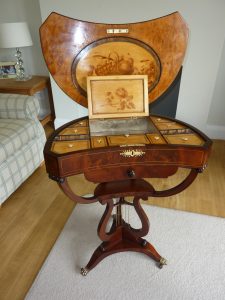When someone dies and it falls to you to become the executor of the estate, you can save a lot of money by doing the probate yourself without using a solicitor.
An executor undertaking a probate without using a solicitor can save you law fees, but unless you are careful there are downfalls to this process which one needs to be aware of, please click here for our restoration website for more information
Executors undertaking this process or handling a probate or inheritance tax process themselves are missing out on inheritance tax relief because they are executing wills without legal advice. Since this process has been instigated HMRC are making record amounts as people are not claiming on their correct and proper relief.
You have to apply for this relief and know how to go about doing so.

Regency ladies needlework table a table like this in poor condition could be valued as low as £60 for probate but for insurance replacement as high as £3000
Solicitors are very costly and sometimes can drag out the whole process therefore making it rather longer than you would wish, but be aware they are costly because they know their business when it comes to claiming relief that might be owed.
Most solicitors very often fall down in the valuation process when they fail to inform the executor that the estate needs to be valued by an expert witness such as a competent valuer. This expert witness will undertake the valuation from room to room recording items of value and merit (to be down valued as much as can be proven) and white goods and general chattels according to HMRC standards .
If the deceased’s estate consists of one room and one chair then this chair should be recorded as a declaration of that estate and the value attached to it which of course will be negligible but if in that one room there is an item of value this should be listed in relation to its value as might be acquired by a local provincial auction.
We are sometimes asked as competent valuers who can act as an expert witness to undertake retrospective valuations when some people undertaking a probate without using a solicitor have valued one or two items rather than the whole estate (as a valuation of one or two items in the property rather than a complete valuation undertaken by a non-expert witness stand a chance of being thrown out by HMRC) as the person undertaking a probate should not be the executor of an estate and an expert witness also.
Many people have computers these days and have access to the Internet therefore they may think it is easy to get probate and they can do it themselves to save on legal costs. But if the benefactors of the estate find out that relief could have been claimed and wasn’t, you as the executor are liable and you could be sued. It is certainly advisable to ask an expert of some sort to check the figures, simply to see if there is any relief to be claimed. It won’t cost much and any extra fees paid can be taken from the estate.
The amount of inheritance tax collected by HMRC in 2016-17 was £4.8 billion, up from £3.1 billion in 2012-13, yet the amount claimed back in relief has fallen from 54 per to 41 per cent over that five-year period. The amount of inheritance tax collected hit a high of £5.3 billion in the year to February 2018.
Now that you can apply for probate online, more people are doing so without understanding the complex procedures. Recent changes to the transfer of the residence nil-rate band inheritance tax relief are quite complex and add to the confusion.
The residence nil-rate band is set at £125,000. It can be added to an estate tax-free when a main home — or assets to the equivalent value if the person has downsized or sold their home — is passed, on death, to a direct descendant. This means that £450,000 of a single person’s estate is tax-free.
Looking for probate valuation? Perhaps you need advice on inheritance tax relief? Contact Malcolm Green, or call on 01986 785198